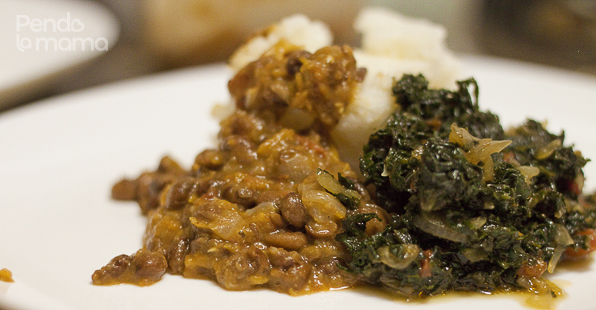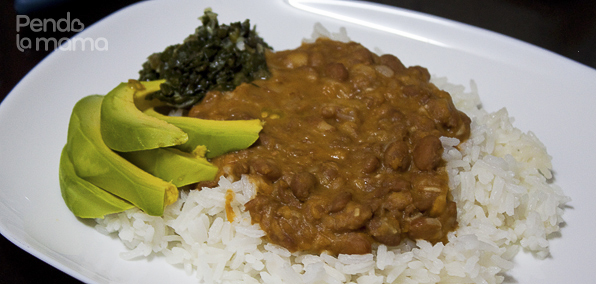Beans. The most loved legume of all time, all around the world, despite it’s flatulence inducing ability.

In a recent post on Leo Tunapika, Gatuiri advises her audience to precook their butter beans with a piece of carrot to reduce flatulence. I heard of a number of different ideas for reducing the gassiness of beans and the two I tried have not worked. I decided this was a subject worthy of a dedicated post.
By the way, Gatuiri made some yummy butter bean burgers, a must try, go check them out.
OK, back to beans and flatulence…
The suggestions I’ve come across:
1. Soak in water over night before pre cooking (my mother)
2. Precook with a peeled potato, then throw out the potato (a relative)
3. Soak on sprite overnight then rinse with water before cooking (web)
4. Precook with a few bay leaves (@gatuiri on instagram)
5. Rinse beans when done pre-cooking, the water they cooked in causes gassiness (@hbarasa on instagram)
6. Add a rolled up ball of aluminium foil to the pot when pre-cooking (web)

I have tried soaking in water overnight and the potato methods. Neither one worked. Maybe it was the type of potato I used! Ha ha! In any case, I did some digging…
What exactly makes these tasty beans have such an undesirable effect? Sugar + Bacteria!
Yup! Beans and other legumes make us gassy, some more than others, because of the complex sugars they contain that we can not digest. The human body simply does not produce the enzymes to break down these sugars. So they just move along in the digestive system without getting absorbed. When they get to the small intestine, they meet their match in the form of a bacteria. These bacteria break down the sugars and this process produces that gas that eventually comes out (hopefully when you are alone, if not alone you hope it’s a quiet one and no one will know it’s you. Or you may be one of those guys that just does a drive-by!)
How do we stop this from happening?
The real key is to break down these sugars before they hit the GI track, or remove as much of them as possible.
The good news is that sugar is water soluble. So there’s a method to all the soaking and throwing way the soaking water madness!! I’ve also discovered that I use too little water. Most of the sites I’ve read recommend soaking in 5 times more water than you have beans. I have to say, my primary reason for soaking over night was so that they would cook faster the next day, reducing the gassy after effects was secondary. I will be soaking in a lot more water from now on.
How does soaking help?
Well, they are seeds. The moment they come into contact with enough moisture the natural germination process begins. The water is absorbed and they swell and the seed coat breaks. Enzymes are activated and begin to breakdown the store of food to what the embryonic plant can process. So the idea is for most of these sugars to be released into the water as the enzymes do their thing. That’s why we throw out the soaking water. You also need to soak it in a lot of water so that there is enough to take up these sugars. A little water can only hold so much.
If you buy canned beans, you also need to throw out the liquid they come in as it will contain a lot of these undesirable gas causing sugars. It is also recommended that you rinse the beans before cooking.
Cooking also aids in breaking down of these indigestible sugars. Ensure that you cook the beans thoroughly! And again, throw out the cooking water (this is when you’re pre-cooking them) because it will contain the gas causing sugars.
It is also suggested that you do not add salt too early in the cooking process as it slows down the softening process. It means your beans will take longer to cook and there fore the complex sugars take longer to break down. It recommended that salt be added half way through the cooking process.
What else?
Spices! Yes, there are spices that can aid in breaking down these sugars further during the cooking process. Ginger, cumin, ajwain (I’ve never heard of this spice), fennel, epazote (never heard of this one either, but it has an enzyme that breaks down the complex sugars) and bay leaves are the most recommended. Apparently they contain traces of chemicals that alter the chemistry of food.
Lastly, the digestion process begins in the mouth. Chew! I mean really chew before you swallow when eating beans, or anything else for that matter. Beans are not the best choice for a meal if you’re in a hurry.
So which method works best?
From what I’ve been reading, do them all. In the end, it is impossible to completely remove all the complex sugars, but all the above will greatly reduce them and therefore also the gassy aftereffects. In fact, some people may not get gassy at all.
Sources: Why do beans cause gas? | Fart too much? How to make beans that won’t make you toot | Types of beas that cause excess gas | Ajwain and Epazope | No gas beans | 7 ways to avoid gas from beans
What of the potato and carrot method? Well, I found that all mentions of potatoes and carrots went something like this:
“My grandmother gave me the secret, she said…”
…which leads me to believe they may just be old wives tales. I was not able to track down anything scientifically sound about either. If anyone out there knows different, please do share in the comments below.